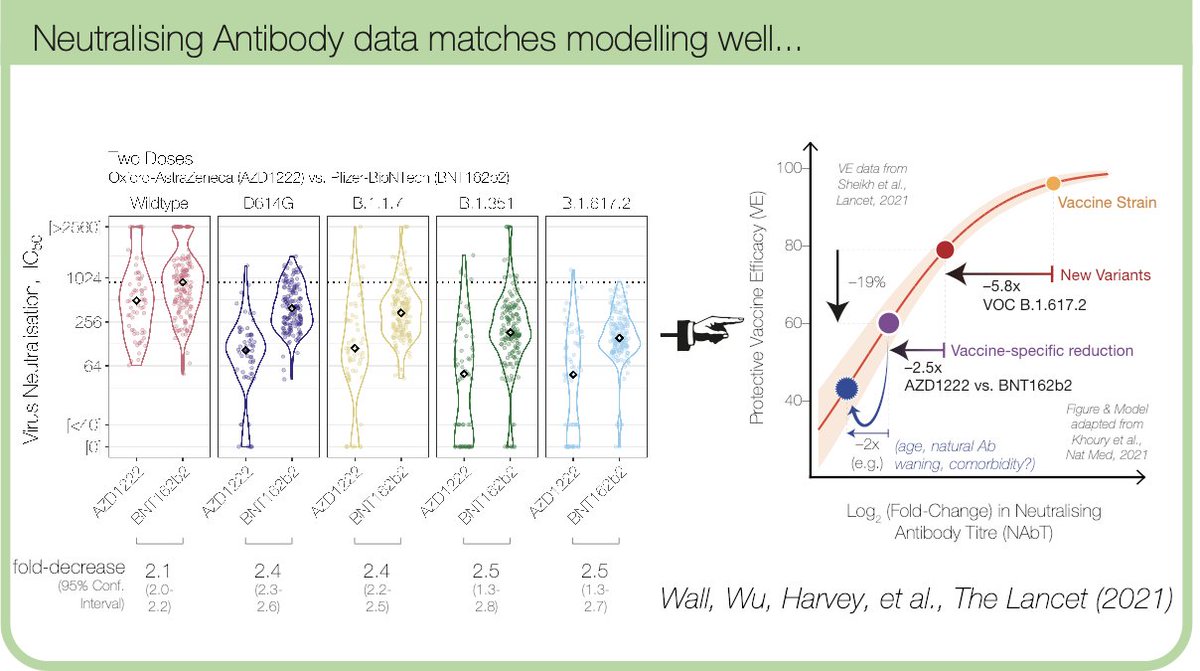
6x reduced antibody neutralisation vs. Delta variant in @TheCrick / @UCLHresearch Legacy study of 106 Oxford-AstraZeneca 1/2-dose vaccinees. 💡Interesting picture emerging, read on! @TheLancet, by @dremmacbw, @MaryYiWeiWu, R Harvey et al. thelancet.com/journals/lance… 1/n 

After 1 dose, wide distribution becomes clearer when you ask people if they have had COVID. Suggests Oxford/AZ vaccine is very good at boosting existing immunity, like mRNA: science.sciencemag.org/content/372/65… (So NO antivaxxers, the vaccine doesn’t ‘destroy’ your natural immunity🤦) 2/n 

Comparing Oxford/AZ to Pfizer/BioNTech: consistent across variants -- BOTH are generating broad Ab responses, and really good match to real-world vaccine efficacy & models of correlates of protection (2.5x less Ab = ~20% less VE for testing positive)... 3/n 

... which would also form part of the basis for why a 3rd Oxford/AZ boost (preprint: papers.ssrn.com/sol3/papers.cf…) or mix ‘n match with other both work very well (preprint: papers.ssrn.com/sol3/papers.cf…) ... 4/n 

... and why both Pfizer & AZ look to be performing well vs. hospitalisation (@PHEuk Preprint: khub.net/documents/1359…). 95% CI still wide, but sadly look to be tightening up. Really could have lived with LESS data on this... 5/n 

The other half to decreased reduced vaccine efficacy is TRANSMISSIBILITY of Delta, which is summed up nicely by @GuptaR_lab, @wendybarclay (#G2P-UK), et al (preprint: researchsquare.com/article/rs-637…) looking at household transmission clusters 6/n 

Worth highlighting again our past data as well from Pfizer vaccinees with drop in neutralising antibody titres with increased age and days since 2nd dose:
https://twitter.com/DavidLVBauer/status/1400581763567652864?s=207/n
And that a fair number of vaccinees are ‘dropping off’ the lower limit of detection in our neutralisation assay (1/40 dilution of serum cannot inhibit 50% of virus infection in the lab)... 8/n 

... despite the fact that our AZ cohort is healthy & much younger than typical recipients (~34 yrs) and than our past Pfizer cohort (~42 yrs), subsetting the Pfizer cohort to match exaggerates the difference... 9/n 

...so would suggest we’ll be seeing more of this in the coming weeks: bbc.co.uk/news/health-57… 👇... 10/n
...and that the trifecta of rising cases, hospitalisations, and now deaths is not JUST unvaccinated people alone 
https://twitter.com/BristOliver/status/1409529970565730311?s=2011/n

As before, we show a "best-case" picture: young (34y), healthy cohort... but WE HAVE THE TOOLS to assess ahead of time - live virus neutralisation assays (like ours) give the best indication of vaccine efficacy (known as "correlate of protection") medrxiv.org/content/10.110… 12/n
"But what about the T-cells?" well, they're lumped in with these neutralising antibody stats ("correlate") at least for the duration of clinical trials i.e. on the half-year timescale or so. So while vaccine rollout is ongoing, these are going to be more accurate than not... 13/n
So, given the immense increase in transmissibility, we need to be working on identifying groups (ethnicity? age? immune status? early-vaccinated?) that tend to NOT show a strong response in neutralisation assays. 14/n
This work got off the ground due to @CharlesSwanton, @LabGandhi, Bryan Williams @UCLHresearch BRC to setting up the SARS-CoV-2 Legacy Study and @TheCrick starting to establish a Serology Pipeline 1 yr ago. 15/n
and the result of collaboration between NHS & UK academic virology labs, especially via #G2P 🇬🇧🦠 UK National Virology Consortium @Thushan_deSilva @CovidGenomicsUK @wendybarclay11. 16/n
underpinned by a great team @TheCrick who took blood samples from volunteers 28 May - 11 June, and were able to turn the samples in under a week 17/n
... and a THANK YOU specifically to the participants of the Legacy study @TheCrick, who booked out every single blood donation slot within an hour... 18/n
... and an emphasis on how much can get done by working together (authors on the paper are virologists, clinicians, data scientists, programmers, lab robotics experts, oncologists, neurologists... all chipping in with their own expertise. 19/n
Where does this leave us? UK vaccine rollout has been a great success, 2nd doses essential vs Delta. Tightrope next few weeks... but situation now dire for countries with low vaccination. So less complaining about summer holidays, please. 20/20
https://twitter.com/rid1tweets/status/1408478277489115147?s=20
Oops, wrong @wendybarclay11 -- mea culpa!
urgh, sorry for the typo on your name @BristOliver ! (and England data... not UK...)
• • •
Missing some Tweet in this thread? You can try to
force a refresh






